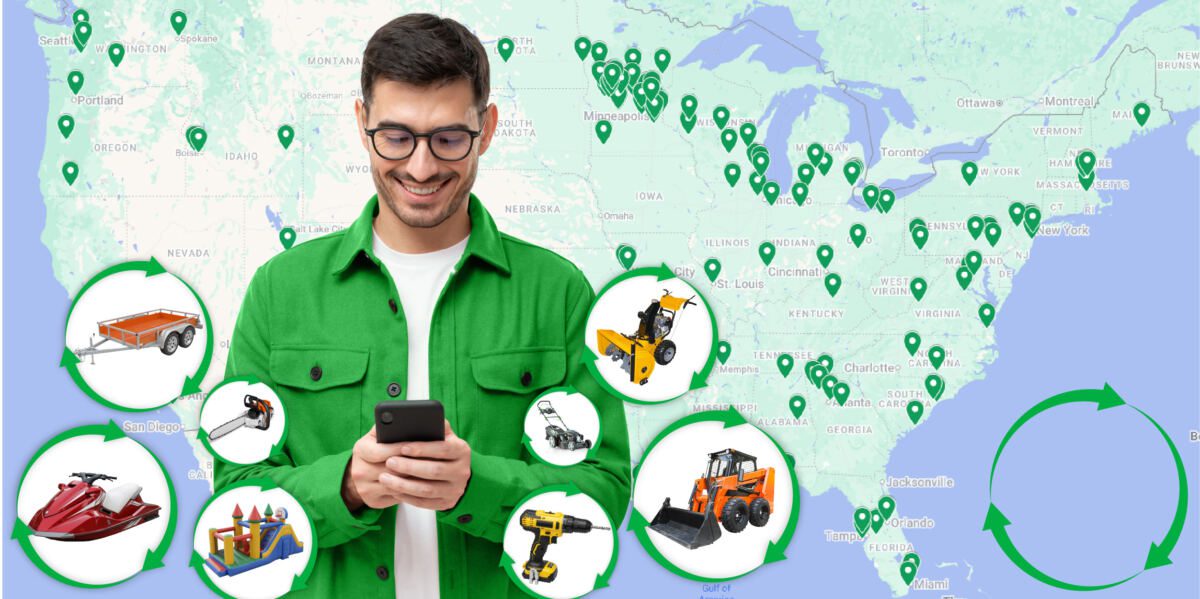The rental marketplace RNTR has quietly positioned itself at the forefront of a sustainability movement that challenges our relationship with ownership. Since launching in November 2024, this hybrid peer-to-peer and business-to-consumer platform has grown across 25+ states, creating a network where community members share everything from power tools to party supplies. The model represents more than convenience — it embodies circular economy principles that could reshape how Americans consume.
Redefining Resource Utilization
Traditional consumption patterns leave countless valuable items gathering dust in garages, storage units, and closets across the country. RNTR addresses this inefficiency by connecting owners of underused assets with neighbors who need temporary access. The platform serves as a bridge between excess capacity and unmet demand, creating value from what already exists rather than encouraging new purchases.
A comprehensive study by Martin, Lazarevic, and Gullstrom published in Cambridge University Press found that sharing scenarios reduced greenhouse gas emissions by 77-85% compared to buying new products. The research analyzed 7,000 listed products on a sharing platform in Stockholm, demonstrating measurable environmental benefits from rental transactions. When someone rents a pressure washer for a weekend project instead of buying one, they prevent a new product from entering the market while giving purpose to an item that might otherwise sit idle.
The platform’s “everything from tools and equipment to party supplies, electronics, and more” philosophy means users can find nearly any item they need within their community. Local availability reduces transportation-related emissions while keeping transactions personal and accountable.
Empowering Local Rental Businesses Through Digital Visibility
Small rental businesses gain additional online exposure for their products through search engine optimization as well as highlighting their products in the RNTR mobile app, without having to change their current operating systems. This digital visibility helps local rental shops reach customers who might never have discovered their services through traditional means.
Many family-owned rental businesses have operated for decades using phone-based bookings and walk-in customers. RNTR extends its market reach without disrupting established workflows or requiring expensive technology upgrades. Local shops can maintain their existing processes while benefiting from increased online discoverability and mobile accessibility.
This enhanced visibility of existing rental inventory supports circular economy principles by maximizing asset utilization without requiring new production. Local rental businesses become more accessible participants in the sharing economy, helping communities access needed items from nearby sources.
Environmental Impact Through Community Action
Every rental transaction represents a small victory against overconsumption. Research published in Nature Communications by Mi & Coffman found that sharing economy models promote sustainable societies through reduced resource requirements. Their study of Shanghai bicycle sharing showed CO2 emission reductions of 25,000 tonnes in 2016 alone, illustrating the scalable environmental benefits of sharing platforms.
Additional research from Climate Neutral Group and CE Delft indicates that rentals can reduce equipment carbon footprints by 30-50% depending on usage patterns. RNTR users participate in this environmental benefit simply by choosing access over ownership, contributing to waste reduction without sacrificing convenience.
Community-based sharing also eliminates many transportation inefficiencies associated with traditional retail. Local exchanges reduce delivery miles while encouraging face-to-face interactions that build social capital alongside environmental benefits.
Technology Enabling Sustainable Behavior
RNTR’s mobile-first design makes sustainable choices convenient rather than burdensome. Real-time availability, secure payments, and automated scheduling remove friction from sharing transactions. The platform’s ID verification, ratings system, and damage-waiver options create trust between strangers, enabling the social cooperation that sharing economies require.
Ryan McCleary, CEO and Founder of RNTR, articulated the platform’s mission simply: “make renting as easy as ordering a ride.” This technological simplification of sharing processes makes circular economy participation accessible to mainstream consumers who might otherwise default to purchasing.
The platform continues expanding its reach weekly, adding new markets and growing its inventory of available items. This growth suggests that technology-enabled sharing represents a scalable solution to overconsumption challenges facing communities nationwide.
Visit the website to learn more, browse available rentals, or list your items today.








